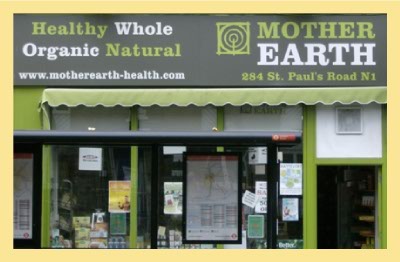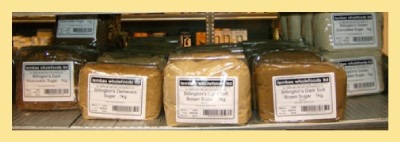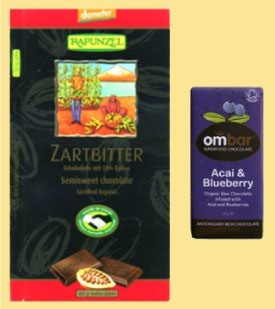

Is Refined Food Really Organic?
By Brane Žilavec, May 2012

In all the years since I first encountered the existence of Organic Refined Foods (see Glossary of the Key Words) I have heard one single argument in favour of their existence, which I can summarize in the following way: "Consumers demand Organic Refined Foods. We need to respect their freedom of choice and give them what they ask for." I have heard such arguments mainly by producers and retailers of organic food. For that reason we need to look at this argument more precisely to see if it stands up to ‘cross-examination’ from multiple perspectives.
7.1 Consumers’ Perception of Organic Food
In general "most consumers are of the opinion that organic food contains fewer undesirable ingredients, has more primary and secondary nutrients and is in some way more vital and healthy." [1] But there is even more to this. The organic shops have established a special image of an almost sacred space where one reconnects with mother Earth in a loving relationship: [2]

But on their shelves one can find – beside many Organic Wholefoods and Non-Organic Wholefoods – also many Organic Refined Foods. Their front image is not congruent with what is inside. It makes customers believe in something which does not yet exist in its full reality. One of the basic aims of marketing strategies is to paint beautiful pictures, as natural as possible. But the reality behind is not always as it is shown on the ‘package’ – as was clearly demonstrated in the previous chapters. We need to learn to see both, the strengths and the weaknesses of the organic movement, its opportunities and threats. Otherwise we are dealing with illusions. For that reason we need to recognise the following danger: "Any attempt by the food industry to compromise the integrity of organic food by adulteration, the wrong kind of processing, or any other cheap and cheerful shortcut, is certain to undermine consumer confidence in the quality and value of what they are buying." [3]
In regard to Wholefood vs Refined there are just too many such compromises. It seems to me that producers, processors, retailers, promoters, as well as consumers of organic food are not aware enough of what they are doing with production, promotion and consumption of Organic Refined Foods. If we want to sell ‘honest food’ which is really ‘Healthy Whole Organic Natural’ then we should first close the gap between the principles of organic food production and what organic companies are producing.
Then those who sell them should look at the disparity between their advertising images and what is on the shelves of their shops. Then we could hope that the perception of organic food by those who still have an original understanding of it and the perception of those who have adopted a more liberal approach might be reconciled.
7.2 Availability of Organic Wholefoods
First it must be recognised that the organic movement has improved the range and availability of Wholefoods significantly. Probably without the existence of the organic movement, and especially new groups of consumers, with their demands for Wholefoods, there would not be so much Wholefood available in the shops today. But from my personal experiences connected with the journey from Slovenia, to the Netherlands, and to England, it seems to me that the range of Organic Refined Foods is expanding, while at the same time I have great difficulties in getting particular products from the range of Organic Wholefoods.
Here are two pictures taken in a wholesale shop in Sheffield [4] that provide some evidence in support of these observations:

Shelf with organic sugars

Shelf with non-organic sugars
It is interesting to see that the range of non-organic sugars is mainly from the brown spectrum, while the range of organic sugars is mainly from white spectrum. In fact, the only whole sugar available in the whole shop was non-organic Dark Muscovado Sugar. These two pictures illustrate the present situation with the availability of organic sugars in UK: it is easier to get all kinds of organic refined sugars – slightly, moderate or highly refined ones – than whole sugar. In my present place I can buy only Rapadura and Coconut Palm Sugar.
Beside the difficulty of getting organic whole sugar is another fact which does not contribute to bigger demand: organic whole sugar is more expensive in comparison with other organic sugars. For example, in the local organic shop, they have three types of organic sugar on the brown spectrum: Demerara (500g) for £1.48; Rapadura (500g) for £2.99; Coconut Palm Sugar (250g) for £4.95. It is evident what an average customer will choose from such an offer. The reason for the high prices of whole sugars might be because of low demand; but then how can one sell more whole sugar if other organic sugars are considerably cheaper and at the same time incorrectly labelled as ‘Natural-Raw-Unrefined’?
Another example is with the availability of Organic Wholefoods, such as biscuits, cakes, or any other type of sweet products where the flour is used. The majority of these products contain either refined flour or refined types of sugars. 100% Organic Wholefood confectionery is an extreme rarity indeed! Now I wonder if I am one of the very rare breed of customers who want to consume Organic Wholefood confectionery or is it that my freedom of choice is not taken as seriously as it is in the case of those who ask for Organic Refined Foods?
On top of this I need to examine very carefully (using a magnifying glass) the labels, to avoid any hidden refined ingredients. With the help of this method I have found so far very few Organic Wholefood chocolate products (i.e., made exclusively with whole sugar): [5]

There might be a few more around, but even in such cases one must admit that there are not a lot if we take into account that there might be several hundred organic chocolate products on sale. Probably, as I can see in the shops, there are more non-organic chocolate products made without any refined sugar than organic ones. So what is going on with the offer of Organic Wholefoods?
7.3 Consumers’ Awareness of Health Consequences
One cannot talk about freedom of choice if people are ignorant about the health consequences of their own choices. Therefore it is not surprising that among the seven deadly threats to organic integrity [6], presented by Patrick Holden, was also placed consumer ignorance. The author's opinion was that "this is the greatest enemy of all." I agree with him on this point, especially in regard to Wholefood vs Refined, for I doubt that people would still consume them if they were really aware of what damage they were causing to themselves.
There is more than enough evidence that people just do not take seriously enough the health risk linked with the regular consumption of Refined Foods, even if they are organic. But consumers are not the main people to blame for such situation, if even producers, processors, retailers, and promoters of organic foods demonstrate such ignorance. I presented a few examples in the topic Avoidance and Ignorance of the Evidence. Here is another one.
When I was investigating the types of sugar labelled in very general terms, such as ‘sugar’ or ‘cane sugar’ (see Appendix 7: Inquiry about Organic Sugars), I sent a letter also to the Booja-Booja Company. The first answer I received from them was: "Thank you for your interest in our products and your enquiry. All that we know about the sugar is that it is a refined cane sugar that is part of the chocolate we buy and use as an ingredient in our truffles. What we receive on delivery is chocolate and not sugar. I am sorry that we could not give you further details."
After my second enquiry where I suggested they ask their provider of chocolate for the further details I got the following answer: "The product specification states that the sugars in the chocolate are sucrose 45% and cacao content of 55%. My understanding is that sucrose is white." When one encounters a person responsible for public relations who doesn't know what kind of ingredients her company uses in their products, then one can ask: How can I as a customer of organic food know what I am consuming if people who are producing them don't know?
When I was trying to gather information from producers in the above mentioned investigation I had really great difficulty in getting clear answers. For example, I asked them to explain if sugar was subjected to any refining and what its colour was. Many answers I received didn’t help much in gaining a better understanding of what I consume. For example: "The raw cane sugar used in the production of Crazy Jack Marzipan has undergone some processing and is medium brown in colour."
It seemed to me that producers themselves were not willing to know what they are really doing. How else can I explain the fact that I have not received answers from seven companies out of sixteen. And even when I sent another letter to those seven, I still didn’t get any reply from three companies (for more precise information about the difficulties in obtaining information from organic producers see Appendix 7: Inquiry about Organic Sugars).
I think that we cannot expect a rise in awareness in regard to the negative health consequences of the consumption of Refined Foods among customers if even those people who use such ingredients in their products somehow try to avoid the challenging questions.
7.4 Special Needs of Consumers
Because of the spread of various eating styles and health problems related to nutrition we can nowadays find in shops special groups of food products which serve the particular specific needs of consumers. For example:
When my friend and I started a small-scale bakery in Slovenia we made everything from 100% Wholefood ingredients only. But as soon we were confronted with demands from some elderly customers who had difficulties in digesting our products, our response was to introduce some products made from a mixture of half wholemeal and half 85% brown and a very few products from 85% brown flour only. The majority of our product was still Wholefood. But we had something for the special needs of a particular group of our customers. However we had never even considered using white flour.
On the basis of these experiences I acknowledge that there are people with specific needs in regard to carbohydrate foods. But these needs have to be addressed in a therapeutic manner. We cannot continue on the same path which has caused the weakening of digestive forces. Changing this is possible only if people improve their eating habits, which is not the case if people simply continue consuming Refined Foods, even if they are organic.
We are here confronting the huge and responsible task of helping all those who need to improve their diets. Human beings should be capable of digesting Wholefoods. [7] If they are not then we need to understand the reasons behind this and act therapeutically. This is what the customers are really expecting from us or – in other words – these are their real demands, even if they might not be so conscious of them. Are there among our customers people who don't want to be strong?
CONCLUSION
One could use the argument about freedom of consumer's choice only under specific basic conditions. These conditions are:
Only under such conditions could one talk about real freedom of choice in regard to Wholefood vs Refined. Real freedom of choice can exist only if people understand what the consequences of their choices are. For that reason our primary task is to educate organic farmers, food processors, traders, and consumers about the real significance of Wholefoods for the health and overall development of the human being. The evidence presented in this report is proof for the need for such ongoing education.

NOTES